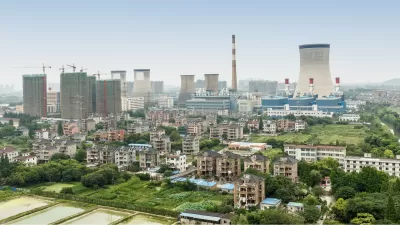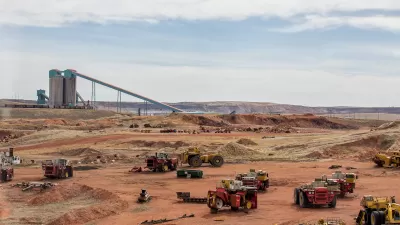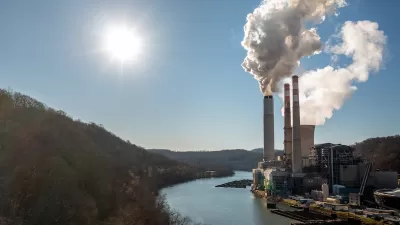NASA's James Hansen takes his global warming message to England, telling them in no uncertain terms that they must stop their reliance on coal-derived electricity. He dismisses 'clean coal' and even 'carbon caps' if coal plants continue to operate.
"Coal is the single greatest threat to civilisation and all life on our planet", writes James Hansen, director of Nasa's Goddard Institute for Space Studies in New York. "He was the first scientist to warn the US Congress of the dangers of climate change."
"The climate is nearing tipping points. If we do not rapidly slow fossil-fuel emissions over the next few decades, we will see effects that are irreversible."
"The trains carrying coal to power plants are death trains. Coal-fired power plants are factories of death. When I testified against the proposed Kingsnorth power plant, I estimated that in its lifetime it would be responsible for the extermination of about 400 species.
If we cut off the (world's) largest source of carbon dioxide - coal - it will be practical to bring carbon dioxide back to 350 ppm, lower still if we improve agricultural and forestry practices, increasing carbon storage in trees and soil.
The three countries most responsible, per capita, for filling the air with carbon dioxide from fossil fuels are the UK, the US and Germany, in that order.
Coal is not only the largest fossil fuel reservoir of carbon dioxide, it is the dirtiest fuel. Coal is polluting the world's oceans and streams with mercury, arsenic and other dangerous chemicals. The dirtiest trick that governments play on their citizens is the pretence that they are working on "clean coal" or that they will build power plants that are "capture-ready" in case technology is ever developed to capture all pollutants."
Thanks to Patricia Matajcek
FULL STORY: Coal-fired power stations are death factories. Close them

Maui's Vacation Rental Debate Turns Ugly
Verbal attacks, misinformation campaigns and fistfights plague a high-stakes debate to convert thousands of vacation rentals into long-term housing.

Planetizen Federal Action Tracker
A weekly monitor of how Trump’s orders and actions are impacting planners and planning in America.

San Francisco Suspends Traffic Calming Amidst Record Deaths
Citing “a challenging fiscal landscape,” the city will cease the program on the heels of 42 traffic deaths, including 24 pedestrians.

Defunct Pittsburgh Power Plant to Become Residential Tower
A decommissioned steam heat plant will be redeveloped into almost 100 affordable housing units.

Trump Prompts Restructuring of Transportation Research Board in “Unprecedented Overreach”
The TRB has eliminated more than half of its committees including those focused on climate, equity, and cities.

Amtrak Rolls Out New Orleans to Alabama “Mardi Gras” Train
The new service will operate morning and evening departures between Mobile and New Orleans.
Urban Design for Planners 1: Software Tools
This six-course series explores essential urban design concepts using open source software and equips planners with the tools they need to participate fully in the urban design process.
Planning for Universal Design
Learn the tools for implementing Universal Design in planning regulations.
Heyer Gruel & Associates PA
JM Goldson LLC
Custer County Colorado
City of Camden Redevelopment Agency
City of Astoria
Transportation Research & Education Center (TREC) at Portland State University
Jefferson Parish Government
Camden Redevelopment Agency
City of Claremont





























